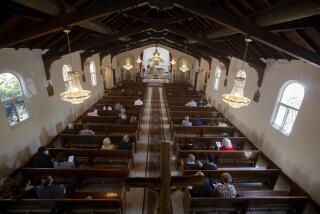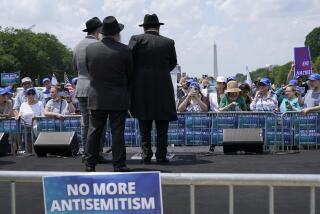How many nonbelievers?
Are there more atheists and agnostics in this country than is commonly supposed? Two studies -- last week’s U.S. Religious Landscape Survey from the Pew Forum and one published two years ago -- suggest so.
The 2006 study from the University of Minnesota does not examine the question of how many non- believers there are but rather makes clear the troubling depth of Americans’ distrust of them. Asked whether they would disapprove of a child’s wish to marry an atheist, 47.6% of the 2,000 randomly selected people interviewed said yes. When asked the same question about Muslims and African Americans, the respondents’ “yes” responses fell to 33.5% and 27.2%, respectively, and the responses dealing with Asian Americans, Latinos and other groups were lower.
When asked which groups did not share their vision of society, 39.5% of those interviewed mentioned atheists -- again, a level of distrust far in excess of that shown to other groups. Sociologist Penny Edgell, the study’s lead researcher, called the results “a glaring exception to the rule of increasing tolerance over the last 30 years.”
The recent study by the Pew Forum reports on the religious affiliations of Americans. It notes that the percentage of self-declared Protestants, although still a bit over 50%, is shrinking; that Catholics make up just shy of 25% of the population, a figure that would be declining were it not for recent immigrants; and that the number of denominations is rising. The study also notes a significant increase in movement from one religious affiliation to another, with almost half of the 35,000 people who participated in this extensive survey saying that they had switched religions.
Of interest to me, however, is that almost one in six (16.1%) of the respondents said they are not affiliated with any particular religious faith, and this figure rises to one in four for 18- to 29-year-olds. Of course, unaffiliated does not mean irreligious, but 4% of Americans say exactly that, with 1.6% and 2.4% describing themselves as atheists and agnostics, respectively. The remaining 12% who are unaffiliated are split more or less in half between those who say they are secular and unaffiliated and those who say they are religious but unaffiliated.
Let me put the two studies together and speculate a bit. Given the negative attitudes toward atheists documented in the Minnesota study, and considering that most people probably don’t see much advantage in incurring the distrust of their religious neighbors and colleagues, the testimony of many people formally classified as religious is suspect. Some nonbelievers, it seems to me, are likely either to lie and say they belong to some established creed, or to fudge their responses by saying they’re spiritual and believe in a nebulously defined God, or are simply unsure.
Whenever surveys, especially surveys of sexual practices, religious beliefs or potentially unpopular opinions, ask people to self-report, the results are dubious. Few American men acknowledged suffering from erectile dysfunction before the introduction of Viagra, yet as ads assure us, millions of motorcycle-riding, party-loving cowboys seem to suffer from it now.
There is also a definitional problem. The question of religious belief is a nuanced one, and different people who hold similar beliefs and are willing to tell the truth will nevertheless give different answers depending on how they interpret necessarily ambiguous questions.
The conclusion I draw is that the number of nonbelievers in a conventionally described God is in the tens of millions and is not limited to angry “neo-atheists” and Madalyn Murray O’Hair clones. Moreover, I think a more fruitful distinction than the one between atheists and theists is the one between those who acknowledge that there are no compelling logical arguments for believing in God (even if they choose to believe anyway) and those who are sure of their God and the literal truth of their particular holy book.
There is a bravery and a wisdom associated with disbelief and honest doubt. As my father used to say, “Uncertainty is the only certainty there is.” More biting is William Butler Yeats’ line: “The best lack all conviction, while the worst are full of passionate intensity.”
More to Read
Sign up for Essential California
The most important California stories and recommendations in your inbox every morning.
You may occasionally receive promotional content from the Los Angeles Times.










